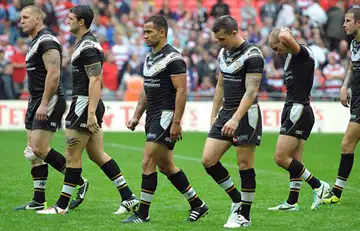Time to start shouting about what we have got

What better way to forget last weekend’s Challenge Cup final than by buying a discounted ticket for next year’s.
In other words, because it was forgetful at best, here’s how cheap we’re making it for you to come back to Wembley next year.
These major events should be the pinnacle of rugby league. People should be fighting over themselves for tickets. It would be interesting to see what percentage of the people who take advantage of the discount tickets on offer, and pushed on a regular basis by the RFL throughout the year, would have actually paid the full price.
It prompted a controversial article from Michael Calvin in the Independent on Sunday, something for which he has copped a lot of flak for from the rugby league Twitterati in the past few days.
Shock horror, people are entitled to opinion. As Calvin is from a national newspaper, the supposed holy grail of media coverage, him gaining access to the biggest game of the rugby league calendar isn’t a problem. Please cover us, Mr Calvin.
The main problem I had with Calvin, was his denial on Twitter that rugby league wasn’t persecuted, for want of a better word, several decades ago in favour of its more commercially aware, internally affluent and universally popular rival code.
Rugby league does have a problem. The issue is, it’s getting that big, no one can quite put their finger on what it is.
Fans sniping at the RFL, players sniping at the RFL, the RFL talking about re-structuring and not much else. The sport is not so much being led through a crisis by a predominantly invisible leader, than being torn to shreds from within.
Rugby league needs to start shouting about what it has got, instead of moaning about what it hasn’t.
Ask yourself what any sponsor would see in terms of value from the game, given the abuse Stobart received, and continue to receive, over their deal; what about the abuse the BBC’s Richard Bacon received for his, admittedly ignorant, coverage of the Challenge Cup draw?
The sponsorship issue has created a lot of anti-RFL feeling this season, but come rugby league’s biggest day out on Saturday, there were empty seats aplenty at Wembley.
We await what decision has been reached for the re-structure of Super League. As much as I warmed to the split option, and it seems clubs have too, hopefully the straight forward promotion and relegation system returns. Rugby league has enough on its plate, without having to explain a complicated system to new fans and commercial partners alike.
A decision had been expected by the end of July, and yet a month on, we still wait. Perhaps it’s a sign that the RFL haven’t managed to talk the majority around to accepting the split option that they were so publicly in favour of.
The re-structure has deflected some much needed attention away from the end of season World Cup, which could be pivotal for the future. Having been positive from the launch of the tournament, my positivity is beginning to wane.
A lack of sponsors, a broadcasting partner in the UK which will barely scratch the surface when it comes to the target market let alone anyone beyond, and the wonder of just how a load of washed up Australians playing in a blue shirt will help develop rugby league in Italy, when there are two federations battling against each other, a situation that isn’t just limited to the Azzurri.
Expansion is important, yes. But is rugby league trying to spread itself too thinly? If it can’t thrive in the supposed heartlands, what chance anywhere else?
If and when much needed funds come in to the game from sponsors, it needs to be invested off the field, in areas such as marketing and commercial. Clubs must put more money up to attract better personnel with better business acumen.
Perhaps we’re crying out for our very own Jim Doyle, the Navman founder and now NRL executive, who was until recently the chief executive of New Zealand Rugby League, to turn around our fortunes. Someone with a business brain to assist with growing the sport.
If rugby league wants to be a commercial success, it needs the tools to start acting like one.